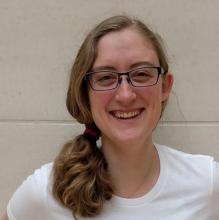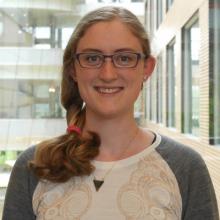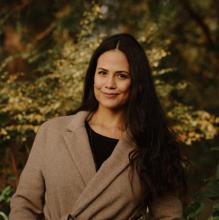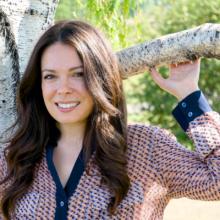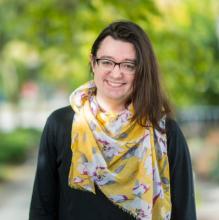Analise is working to incorporate learning interventions into an upper-year biology laboratory to emphasize skills from previous courses or other disciplines of relevance. She hopes to improve the learning outcomes of students by helping them practice transferring knowledge from other disciplines to the context of their labs and beyond.
Research Description
Saccharomyces cerevisiae is the model organism I use to study the localization of cellular components during cell division. While cells divide they closely control what does and doesn’t get transported to the growing daughter cell; by ensuring cellular components localize properly, the cell is able to ensure that future generations are not pre-aged by old cellular components. By using yeast to study cellular component localization, it allows me to harness high-throughput techniques that wouldn’t otherwise be possible, for example high-throughput genetic analysis and high-throughput microscopy to discover how different genes and proteins contribute to the control of cellular compartmentalization during cell division. Furthermore, the requirements of my project have lead me to integrate computer coding into my utility belt of skills to enable me to design time saving analysis techniques.
What does being a Public Scholar mean to you?
I am excited to be a part of the public scholar’s program, because it allows me to work on interdisciplinary projects that I otherwise wouldn’t be able to do. My research in cell biology, using yeast as a model to study how cells control and organize the localization of components within the cell, intends to answer very basic questions about cells, and is far removed from clinical relevance. By being a public scholar, I can use practical skills I have learned in the lab and in the Certificate in Advanced Teaching and Learning to help improve efforts to connect knowledge from different fields required to be a well-rounded biology practitioner, and more generally help improve and emphasize transfer of knowledge into new contexts.
In what ways do you think the PhD experience can be re-imagined with the Public Scholars Initiative?
The Public Scholars Initiative allows PhD students to bring to life projects that they wouldn’t normally be able to do, and can bring another element of interdisciplinary practice to a PhD project. Often I get caught up in my project, and I get stuck in a silo and forget about the greater good my project or what I am learning may play in the grand scale of things. PSI forces us to think about how our transferable skills can be used in other contexts around campus and for the public good. The formation of networks of diverse people with many expertise is invaluable and can help bring new perspectives and methods to a research question.
How do you envision connecting your PhD work with broader career possibilities?
My PhD project has challenged me to learn skills from many disciplines within and beyond biology. I have been exploring the advances in how science education at the post-secondary level, specifically in biology, and I have realized that there can be more done to help students integrate knowledge between classes into a larger framework of working knowledge. I would definitely like to pursue more research into good science teaching practices, science outreach, and integrated curriculum development.
How does your research engage with the larger community and social partners?
I will be working with instructors and graduate students at UBC to design lessons to help integrate and re-contextualize concepts within a biology laboratory. I hope what is learnt from my research project will be useful and encourage other educators to design curriculum with knowledge transfer in mind, and help improve knowledge transfer between courses within a typical program’s curriculum.
Why did you decide to pursue a graduate degree?
I have always enjoyed learning, and in my undergraduate degree I enjoyed all the hands-on learning that occurred in my lab courses and honors thesis. I applied to graduate school to be able to pursue new research questions to contribute to the scientific body of work. I would not have predicted half of what I have learned over the last few years and the amazing connections I have made with other people!
Why did you choose to come to British Columbia and study at UBC?
UBC is an innovative research institution and I was drawn to my program, Genome Science & Technology, because of the opportunity it gave me to test out different research projects before settling on a lab and research topic. Being at UBC also meant that I could come back home, and enjoy the great outdoors year round!
By being a public scholar, I can use practical skills I have learned in the lab and in the Certificate in Advanced Teaching and Learning to help improve efforts to connect knowledge from different fields required to be a well-rounded biology practitioner, and more generally help improve and emphasize transfer of knowledge into new contexts.

